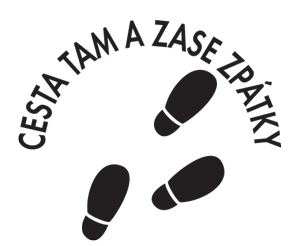The story of Ms. Hradilová
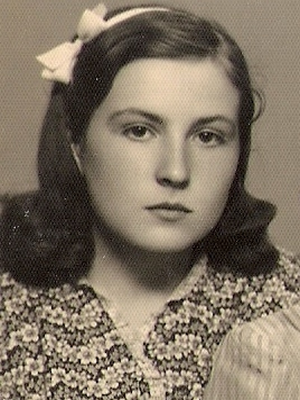 Ludmila Hradilová, her maiden name Šimečková, was born in 1934 in Tršice, a village near Olomouc. Her parents ran a local shop where the whole family helped out. As the firstborn of three children, Ms Hradilová was expected to take over her parents' business. Unfortunately, she could not enroll in an economic school because of the newly established communist regime. So it seemed as a suitable solution for her to enroll in the new social school in Přerov which was transformed into an pedagogical high school in the next year. when she finished her studies, she received a position (educated employees could not choose their position, the were given one by the state) in Rýmařov. In 1958, she met and married Jindřich Hradil, whose family owned a farm in Haná.
Ludmila Hradilová, her maiden name Šimečková, was born in 1934 in Tršice, a village near Olomouc. Her parents ran a local shop where the whole family helped out. As the firstborn of three children, Ms Hradilová was expected to take over her parents' business. Unfortunately, she could not enroll in an economic school because of the newly established communist regime. So it seemed as a suitable solution for her to enroll in the new social school in Přerov which was transformed into an pedagogical high school in the next year. when she finished her studies, she received a position (educated employees could not choose their position, the were given one by the state) in Rýmařov. In 1958, she met and married Jindřich Hradil, whose family owned a farm in Haná.
Ms Ludmila's life was deeply affected by events that took place at the fault line between two eras: nazism and communism. Neither was any good. After the war, everybody was expecting a period of peace and calm, while the communists were silently preparing to overthrow the government. After the year 1948, an era of censorship, fear, uncertainty and confiscations followed. Worst off were those people who did not comply with the system, such as wealthy farmers. Ms Ludmila's father-in-law owned a large estate in Bolelouc and his son Jindřich was expected to take charge of it. The communists kept increasing the compulsory contributions so that the norms were impossible to fulfill. These worries had deletrious effect on the father-in-law's health. One day, he lost his nerve and he assaulted a clerk, for which he was condemned to jail. His bad health saved him from imprisonment. Subsequently, due to relentless pressure, the family “donated” their property to the state. The parents were left homeless and robbed of all property.. There was the option for them to move to the deserted country along the border but thanks to their sons' assistence a small house was built for them so they could stay.
The family business of Ms Ludmila's parents also fell through to the state. As she recalls, her husband, despite his better education, was forced to take jobs far below his possible because he didn't fit into the charts of thetotalitarian regime.
Ms Ludmila finished her story with the following words:
“Democracy doesn't mean only the rights but also the responsibilities.”
Communist confiscations of property (IAC) - The story of the Přindiš family
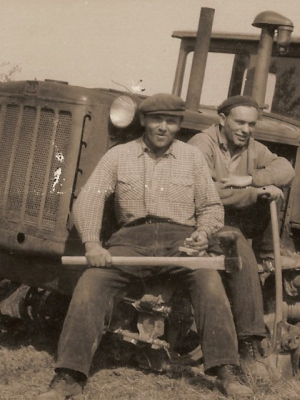 Pavel Přindiš was born in 1936 in Šternberk. He spent his childhood in the nearby village of Bělkovice. He is still living there to this day. He comes from a family of nine siblings. After elementary school, he wanted to study horticulture in Brno but this was not possible due to the communist regime. Therefore, he became a serviceman of agricultural machinery.
Pavel Přindiš was born in 1936 in Šternberk. He spent his childhood in the nearby village of Bělkovice. He is still living there to this day. He comes from a family of nine siblings. After elementary school, he wanted to study horticulture in Brno but this was not possible due to the communist regime. Therefore, he became a serviceman of agricultural machinery.
As Pavel Přindiš recalls, the communist rise to power brought many changes and regulations. Farmers were newly made to turn in assigned amounts and quality of milk, cream, parsley and spinach. When somebody was unable to yield these products either they could provide other produce such as malt or wheat, or go to jail. Further on into the years of the regime, the communists stopped taking any heed of propriety whatsoever and broke into people's homes, turned them upside down and took anything they wanted. People had no means of defense and often they were left without provision.
His father was among the most successful farmers in the village. People envied him and tried to bring him down to his knees. IAC (Integrated Agricultural Cooperative) agitators went around the village and knocked on doors; people tried to keep out of their way or tried to avoid them. Pavel Přindiš's father didn't let them break him and make him enter the IAC. Therefore, in their terms he became a kulak. The life of a kulak was different from other villagers who complied and agreed to enter the IAC. For example, compliant people received clothing coupons for half the price, whereas kulaks always had to pay the full price. “Candies, that's something our children didn't know at all because they were simply too expensive.“ Another misfortune struck the family when they brought wood (from their own forest!) to repair their house. They were charged a fine of CSK 1037 and the father was sentenced to six months of prison. In prison, he caught a bad asthma and died soon afterwards.
“We heard that some of the villagers always behaved so as to be as well off as possible, and they were not ashamed to report on others. They stood under windows, listened to what people were saying, so that they could report anyone who spoke against the regime and in some cases, such reports would destroy the people reported upon. Also, whenever a high-ranking official took interest in a house, occupied or not, it became their property. People who previously lived there, who didn't know in the least what was happening, were forced to leave their houses with only their clothes and other basic things. They were given a different home, often in a deplorable state.“
The Communists knew people were afraid of them, and they took advantage of it abundantly. Refusal to cooperate with the regime meant, in most cases, imprisonment. Another example of the regime's felony is that it didn't honor agreements. The Přindiš family owned many animals, including two horses the Communists were interested in. Their price was estimated at CSK 2500, but the sum was marked down with a smudgy pencil on a small piece of paper so that it would later be illegible. The family didn't ever get the money.
The end of the regime came in November 1989 and restitutions followed soon. The Přindiš family received their property back within two yeas. However, many people's property could not be returned or, as was often the case, in a very bad state.
The Story of Ms. Šestáková
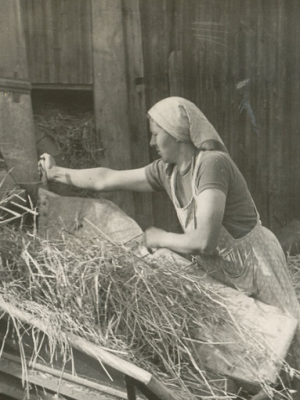 "I remember my father had CSK 50.000 in savings. That was a lot of money.
After the monetary reform, he was left with CZK 500."
"I remember my father had CSK 50.000 in savings. That was a lot of money.
After the monetary reform, he was left with CZK 500."
Helena Šestáková, née Nodžáková, was born in Slovakia on November 11, 1928. This was where she grew up; she lived here until 1945. Since early childhood, she helped her mother on the family farm. They were not very wealthy so they had to do with what they grew on the farm and made themselves. Her dad, Josef Nodžák, had to travel over the border to work. Years of labor in Belgian mines affected his health very badly. Josef loved working on his fields and was an excellent farmer. However, when he returned from the mines, this kind of activity became difficult for him. The fields were located on steep sides of hills and he found himself short of breath ploughing. When, in 1945, his two sisters came to visit, he heard that in the Czech part of Czechoslovakia there were countless fields and houses abandoned by the Germans (who were subject to removal in their turn, after the war) with nobody to tend them so he decided to move to a small village called Jílová. Immediately, despite his wife's protestations, he started to give away or sell the property in Slovakia. However, when they came to Jílová, they were given one of the worst houses in the village, with a leaky roof where rats had their spree. They had to share the house with a German family so there was really very little space there. They stayed together between October 1945 and May 1946 when the Germans were removed from the country as part of the post-war retributions. During this time, they became as if one family. Helena's dad used to work in Germany for a short time, and therefore had no trouble communicating with the second family. Frida, daughter of the German parents, picked up perfect Slovak during the half-year they lived together and interpreted for the mothers who would otherwise be unable to communicate. When time to leave came, all of them cried bitterly. The Germans hoped they would return to their house one day; that, however, was never to be.
The family lost virtually all their savings during the monetary reform of 1953. The money that was earned with difficulty came almost to nothing. Helena's father was devastated, but he knew there was no way back. There was nothing left from what they previously owned in Slovakia, so they had to stay in Bohemia with the little money they were left with. Most members of their Slovak family returned to Slovakia, only Josef and two of his brothers remained. In the autumn, the state started to demand a portion of the farmers' production. Unsurprisingly, Josef and other farmers did not like the idea. Josef briskly decided to sell his large farm rather than to share his harvest. His health was too bad for him to take on such heavy labor and nobody else could replace him. His sons were too young and everyone else had work enough. They moved into a smaller house on the other side of the village.
By that time, Helena was nineteen and married. She had to share the house where they moved with her parents and her husband František's grandparents, so they did not have much space. The previous owners of the house had moved to Šternberk, leaving behind a bull, a cow, a pig and about 35ha of land. Soon after the arrival of Helena's family, Jívová founded its Integrated Agricultural Cooperative (IAC). Confiscations of property and land began immediately. When they came to Helena's home, she had to turn over the cow and the all the fields. The family was allowed to keep only a strip of land behind the house to grow potatoes on. Although the large field became IAC property, the family still had to work on it and they were given only a small portion of the harvest in return for the work. The IAC also paid a the minimum monthly wage, CSK 250 to Helena and CSK 600 to František. They had to make ends meet with what they had. As Helena puts it: “Bad times, but there was enough to live on!”
Helena is 84 now. She has five sons and many grandchildren, and it is her large family that makes her happy. She keeps a small piece of land behind her house and spends much of her time on it, as she was used to do throughout her life. Despite the lifetime of manual labor in the fields and forests, Helena's health is still excellent and she feels good. She often thinks about her youth. Watching people and how they treat each other today, she feels dismayed, and she is happy to have lived in the previous times. She has always been used to mutual support and helpfulness, something that is hard to come by nowadays.
Ing. J. J. Tylšer
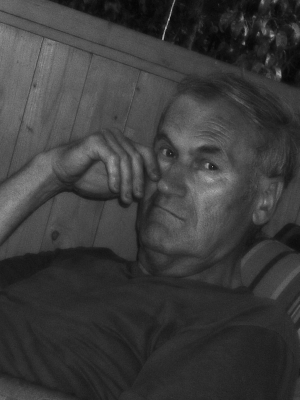 Ing. Jiří Jaroslav Tylšer (born September 9, 1944) was born in Grygov and later, as a four-year-old, moved with his parents and his sister Helena to Šternberk. Here, his father František started a cabinetmaking business, becoming the best woodworker in the town, until the newly established communist regime took over his business between 1948 and 1950.
Ing. Jiří Jaroslav Tylšer (born September 9, 1944) was born in Grygov and later, as a four-year-old, moved with his parents and his sister Helena to Šternberk. Here, his father František started a cabinetmaking business, becoming the best woodworker in the town, until the newly established communist regime took over his business between 1948 and 1950.
“I have not been a communist even during those first days of the revolution. I prefer the word freedom to dictatorship, the word man to mass. The word proletariat can be shamefully abused, the banners of class hatred wildly waved...“ - Ferdinand Peroutka
In 1950, Jiří Tylšer entered first grade. From the very beginning, he felt the hatred installed in some people. He recognised two types of them. Those who did not let it on and those who demonstrated their hatred openly. His fourth grade teacher was among the latter. She explained the word EXPLOITER on the example of Mr. Tylšer's father in front of the whole class. In a frenzy, she kicked repeatedly into Mr. Tylšer's schoolbag and books, as if to show exactly how she thought such people should be treated.
At the time, fear was ubiquitous. People spoke differently in public and at home. The Voice of America and Radio Free Europe were daily on the program in the Tylšer family. Mr. Tylšer recalls one particular souvenir: „Everytime we listened to Radio Super Major with my father, we could hear quiet footsteps on the roof. And dad would call out: 'Watch out, here he comes!' For many years, I did not understand what he meant. When I was fifteen, strong enough to cope with a grown man, it happened again and I understood that it was a snitch who was checking whether we were listening to banned western broadcast. I was prepared to face him then. I declared: 'I'm looking out for you! Dare you show up hereabouts again, I'll smash your face!' The man disappeared jumping over the fence and, what surprised us not a little, he disappeared into one of the houses just across the street. He never showed up again at our house.
In 1953 came the monetary reform. Citizens who owned land or had any savings, literally lost everything over night. Those with immovable property were given a choice: either they would enter the Party or they would refuse and be liquidated. František Tylšer was accused of having torn down a poster with Stalin, and his cousin, a furrier, of having sold a fur coat on the black market in Prague, which was nonsense. The cousin was sentenced to 22 years of prison, stayed imprisoned for sixteen years, while his family was banished from their home in the city of Prostějov. When he was released conditionally, a Party official lived in his house and it was made clear to him that his further presence in Prostějov was not welcome.
In the fifties and sixties, Šternberk was full of army barracks and aviation schools. Jiří Tylšer finished his studies at the technological high school in Uničov and wanted to enroll at the university in Brno. He passed the entry exams but was refused for the reason that there were too many applicants from the military and aviation schools. In the end it turned out that the reason was quite different – his cousin emmigrated to England, which did not please the regime. Mr. Tylšer thereafter found a different job but did not give up his dream. Seventeen years later, he started studying at distance at a construction college in Brno and received his title in engineering in 1979.


 Ludmila Hradilová, her maiden name Šimečková, was born in 1934 in Tršice, a village near Olomouc. Her parents ran a local shop where the whole family helped out. As the firstborn of three children, Ms Hradilová was expected to take over her parents' business. Unfortunately, she could not enroll in an economic school because of the newly established communist regime. So it seemed as a suitable solution for her to enroll in the new social school in Přerov which was transformed into an pedagogical high school in the next year. when she finished her studies, she received a position (educated employees could not choose their position, the were given one by the state) in Rýmařov. In 1958, she met and married Jindřich Hradil, whose family owned a farm in Haná.
Ludmila Hradilová, her maiden name Šimečková, was born in 1934 in Tršice, a village near Olomouc. Her parents ran a local shop where the whole family helped out. As the firstborn of three children, Ms Hradilová was expected to take over her parents' business. Unfortunately, she could not enroll in an economic school because of the newly established communist regime. So it seemed as a suitable solution for her to enroll in the new social school in Přerov which was transformed into an pedagogical high school in the next year. when she finished her studies, she received a position (educated employees could not choose their position, the were given one by the state) in Rýmařov. In 1958, she met and married Jindřich Hradil, whose family owned a farm in Haná.
 Pavel Přindiš was born in 1936 in Šternberk. He spent his childhood in the nearby village of Bělkovice. He is still living there to this day. He comes from a family of nine siblings. After elementary school, he wanted to study horticulture in Brno but this was not possible due to the communist regime. Therefore, he became a serviceman of agricultural machinery.
Pavel Přindiš was born in 1936 in Šternberk. He spent his childhood in the nearby village of Bělkovice. He is still living there to this day. He comes from a family of nine siblings. After elementary school, he wanted to study horticulture in Brno but this was not possible due to the communist regime. Therefore, he became a serviceman of agricultural machinery.
 "I remember my father had CSK 50.000 in savings. That was a lot of money.
After the monetary reform, he was left with CZK 500."
"I remember my father had CSK 50.000 in savings. That was a lot of money.
After the monetary reform, he was left with CZK 500."
 Ing. Jiří Jaroslav Tylšer (born September 9, 1944) was born in Grygov and later, as a four-year-old, moved with his parents and his sister Helena to Šternberk. Here, his father František started a cabinetmaking business, becoming the best woodworker in the town, until the newly established communist regime took over his business between 1948 and 1950.
Ing. Jiří Jaroslav Tylšer (born September 9, 1944) was born in Grygov and later, as a four-year-old, moved with his parents and his sister Helena to Šternberk. Here, his father František started a cabinetmaking business, becoming the best woodworker in the town, until the newly established communist regime took over his business between 1948 and 1950.
























